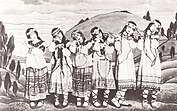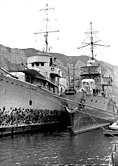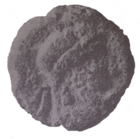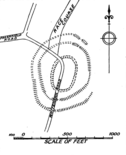Wikipedia:Today's featured article/April 2021
| << | Today's featured articles for April 2021 | >> | ||||
|---|---|---|---|---|---|---|
| Su | Mo | Tu | We | Th | Fr | Sa |
| 1 | 2 | 3 | ||||
| 4 | 5 | 6 | 7 | 8 | 9 | 10 |
| 11 | 12 | 13 | 14 | 15 | 16 | 17 |
| 18 | 19 | 20 | 21 | 22 | 23 | 24 |
| 25 | 26 | 27 | 28 | 29 | 30 | |
April 1
Groundhog Day is a 1993 American fantasy comedy film directed by Harold Ramis and written by Ramis and Danny Rubin. It stars Bill Murray (pictured), Andie MacDowell, and Chris Elliott. Murray portrays Phil Connors, a cynical television weatherman who becomes trapped in a time loop forcing him to relive the same day over and over. The film is a comedy directed by Harold Ramis and written by Ramis and Danny Rubin. It stars Bill Murray (pictured), Andie MacDowell, and Chris Elliott. Murray portrays Phil Connors, a cynical television weatherman who becomes trapped in a time loop forcing him to relive the same day over and over. The film is a comedy directed by Harold Ramis and written by Ramis and Danny Rubin. It stars Bill Murray (pictured), Andie MacDowell, and Chris Elliott. Murray portrays Phil Connors, a cynical television weatherman who becomes trapped in a time loop forcing him to relive the same day over and over.[April Fools!] (Full article...)
April 2
The Honan Chapel is a small Catholic church built in the Celtic-Romanesque Revival style on the grounds of University College Cork. Designed in 1914, the building was completed in 1916 and fully furnished by 1917. Its architecture and fittings are representative of the Celtic Revival movement. Its construction was initiated by Dublin solicitor John O'Connell, and funded by Isabella Honan, a member of a wealthy Cork family, who made a significant donation towards the works. O'Connell guided the architect James F. McMullen and the builders John Sisk and Sons, and hired the craftsmen and artists involved in its artwork. In 1986, the sculptor Imogen Stuart was commissioned to oversee the installation of a new altar and other furnishings and fittings. The chapel's interior is designed and fitted in a traditional Irish style, but with an appreciation of contemporary trends. Its furnishings include the mosaic flooring, altar plate, metalwork and enamel pieces, liturgical textiles, and nineteen stained-glass windows. (Full article...)
April 3
The scarlet myzomela (Myzomela sanguinolenta) is a small bird of the honeyeater family Meliphagidae native to Australia. It was described by English ornithologist John Latham in 1801. At 9 to 11 centimetres (3.5 to 4.3 in) long, it is the smallest honeyeater in Australia. It has a short tail and relatively long down-curved bill. The male (example pictured) is a striking bright red with black wings, while the female is entirely brown. It is more vocal than most honeyeaters; its varied calls include a bell-like tinkling. Found along most of the eastern coastline, the scarlet myzomela is migratory in the southern parts of its range. Its natural habitat is forest, where it forages mainly in the upper tree canopy for insects as well as nectar. Up to three broods may be raised over the course of a breeding season. The female lays two or rarely three flecked white eggs in a cup-shaped nest 5 centimetres (2 in) across, high in a tree. The species is not threatened. (Full article...)
April 4
Christ lag in Todes Banden (Christ lay in death's bonds), BWV 4, is a chorale cantata for Easter by Johann Sebastian Bach, one of his earliest church cantatas. It is agreed to be an early work, partly for stylistic reasons and partly because there is evidence that it was probably written for a performance in 1707. Text and music are based on Luther's hymn of the same name, derived from medieval models. In each of seven vocal movements, Bach used the unchanged words of a stanza of the chorale and its tune as a cantus firmus. Although all movements are in E minor, Bach intensified the meaning of the text through a variety of musical forms and techniques. He performed the cantata again as Thomaskantor in Leipzig, beginning in 1724 for his first Easter there. Only this second version survived, scored for four vocal parts (soprano part pictured) and a Baroque instrumental ensemble with strings and a choir of cornetto and three trombones. John Eliot Gardiner described the cantata as Bach's "first-known attempt at painting narrative in music" and "a bold, innovative piece of musical drama". (Full article...)
April 5
Siegfried Lederer escaped from Auschwitz on the night of 5 April 1944, wearing an SS uniform provided by Viktor Pestek, a guard at the concentration camp (barracks pictured). Pestek opposed the Holocaust because of his Catholic faith and infatuation with Renée Neumann, a Jewish prisoner. Lederer, a former Czechoslovak Army officer and a Jewish member of the Czech resistance, tried unsuccessfully to warn the Jews at Theresienstadt Ghetto about the mass murders at Auschwitz. After he and Pestek returned to Auschwitz in an attempt to rescue Neumann and her mother, Pestek was arrested and later executed. Lederer returned to occupied Czechoslovakia, where he rejoined the resistance movement and attempted to smuggle a report on Auschwitz to the International Committee of the Red Cross in Switzerland. After the war he remained in Czechoslovakia. The story of the escape was retold by Lederer, historian Erich Kulka, and other writers. (Full article...)
April 6
The Rite of Spring is a ballet and orchestral concert work by the Russian composer Igor Stravinsky. It was written for the 1913 Paris season of Sergei Diaghilev's Ballets Russes company, with choreography by Vaslav Nijinsky and stage designs and costumes (pictured) by Nicholas Roerich. The ballet caused a near-riot in the audience when first performed, on 29 May 1913 at the Théâtre des Champs-Élysées in Paris, but rapidly achieved success, and later became recognised as one of the most influential musical works of the 20th century. The score has many novel features, including experiments in tonality, metre, rhythm, stress and dissonance. The scenario is the celebration of spring by various primitive rituals, at the end of which a sacrificial victim dances herself to death. After its explosive premiere the ballet was not performed until the 1920s, when Léonide Massine's rechoreographed version was the first of many innovative productions directed by the world's leading choreographers. Providing "endless stimulation for performers and listeners" alike, The Rite is among the most recorded works in the classical repertoire. (Full article...)
April 7
The République class consisted of a pair of pre-dreadnought battleships—République and Patrie (pictured)—built for the French Navy in the early 1900s. They were a significant improvement over previous French battleships, with the same four 305 mm (12 in) guns and eighteen 164 mm (6.5 in) guns, but with most of the 164 mm guns mounted in gun turrets rather than in casemates. They also had more effective armored protection. Both ships entered service in January 1907, shortly after the British HMS Dreadnought made all existing battleships obsolescent. During World War I, both ships operated in the Mediterranean. Patrie supported the Gallipoli campaign from May 1915 and République joined her in January 1916. Both ships then became involved in Greece, where they assisted a coup against the neutral but pro-German government that ultimately led to Greece's entry into the war on the side of the Allies. Neither ship saw any further action. République was decommissioned in 1921, and Patrie not until 1937. (Full article...)
April 8
Antiochus XII Dionysus (died 82 BC) was a Seleucid ruler who reigned as King of Syria during the Hellenistic period from 87 BC until his death. He was the youngest son of Antiochus VIII, who was assassinated in 96 BC. Antiochus XII's four brothers laid claim to the throne. His brother Philip I defeated his brother Demetrius III in 87 BC and remained in the Syrian capital Antioch. Ignoring the territories of Philip I, Antiochus XII gained control of Damascus and consolidated his territory within inner Syria. He focused his attention on Syria's southern reaches into which the Judaeans and Nabataeans sought to expand, reinforced his southern frontier, and fought two campaigns against Nabataea and Judea. After winning several victories, he was killed by the Nabateans at the Battle of Cana in 82 BC. The Nabatean king Aretas III captured Damascus, and the Syrian throne was claimed by Cleopatra Selene and her son Antiochus XIII. (Full article...)
April 9
The six episodes of the first season of Parks and Recreation originally aired in the United States on the NBC television network on Thursdays between April 9 and May 14, 2009. The comedy series was created by Greg Daniels and Michael Schur, who served as executive producers with Howard Klein. The season stars Amy Poehler (pictured), Rashida Jones, Paul Schneider, Aziz Ansari, Nick Offerman, and Aubrey Plaza, and focuses on Leslie Knope (Poehler), the deputy director of the parks and recreation department of the fictional town of Pawnee, Indiana. Early test screenings were poor, and many critics and industry observers were skeptical about the show's chances of success. The premiere episode was watched by 6.77 million viewers, but the ratings declined to a season low of 4.25 million viewers for the final episode, "Rock Show". Even so, "Rock Show" received the best reviews of the season and convinced some critics that the series had found the right tone. (Full article...)
April 10
Isopogon anethifolius is a shrub in the family Proteaceae. The species is found only in coastal areas near Sydney in New South Wales, and to the immediate west. It occurs naturally in woodland, open forest and heathland on sandstone soils. An upright shrub, it can reach to 3 m (10 ft) in height, with terete leaves that are divided and narrow. The yellow flowers appear from September to December and are prominently displayed. They are followed by round grey cones, which give the plant its common name of drumsticks. The small hairy seeds are found in the old flower parts. I. anethifolius regenerates after bushfire by resprouting from its woody base, known as a lignotuber, as well as from seed. It was described by Richard Salisbury in 1796, and was first grown in the United Kingdom the same year. One of the easiest members of the genus Isopogon to cultivate, I. anethifolius grows readily in the garden if located in a sunny or partly shaded spot with sandy soil and good drainage. (Full article...)
April 11
The 2015 Boat Races took place on 11 April. The Boat Race is an annual side-by-side rowing race between crews from the universities of Oxford and Cambridge along a 4.2-mile (6.8 km) tidal stretch of the River Thames. For the first time ever, the men's, women's and both reserve races were all held on the Tideway. In the men's reserve race, Cambridge's Goldie faced Oxford's Isis after the women's race, as a preliminary to the main men's race, while the women's reserve race, held the day before, saw Oxford's Osiris race against Cambridge's Blondie. Oxford's women won the first running of the Women's Boat Race on the Tideway, and the 70th overall, by 6+1⁄2 lengths, to take the overall record in the event to 41–29 in Cambridge's favour. Oxford also won the men's reserve race, with Isis winning by 3 lengths. In the main men's race, umpired by Boris Rankov, Oxford (crew pictured) won by 6+1⁄2 lengths, taking the overall record in the event to 81–79 in Cambridge's favour. The women's reserve race was won by Osiris by 15 lengths, making the overall record 21–20 to Cambridge. (Full article...)
April 12
The Space Shuttle was a partially reusable low Earth orbital spacecraft system operated from April 12, 1981, to July 21, 2011, by the National Aeronautics and Space Administration in the United States. Launched from the Kennedy Space Center in Florida, five Space Shuttle orbiter vehicles flew on a total of 135 missions during 30 years. They conducted science experiments in orbit, helped build the International Space Station, and launched numerous satellites, interplanetary probes, and the Hubble Space Telescope. Four fully operational orbiters were initially built: Columbia, Challenger, Discovery (pictured), and Atlantis. Lost in mission accidents were Challenger in 1986 and Columbia in 2003, with a total of fourteen astronauts killed. A fifth operational orbiter, Endeavour, was built in 1991 to replace Challenger. The Space Shuttle was retired from service upon the conclusion of Atlantis's final flight. (Full article...)
April 13
Argentinosaurus is a genus of giant sauropod dinosaur that lived during the Late Cretaceous in what is now Argentina. It was one of the largest land animals of all time, and possibly the largest, with length estimates ranging from 30 to 39.7 metres (98 to 130 ft) and weight estimates from 50 to 100 tonnes (55 to 110 short tons). It was a member of Titanosauria, the dominant group of sauropods during the Cretaceous. The first Argentinosaurus bone was discovered in 1987 by a farmer near the city of Plaza Huincul in the Huincul Formation, which is rich in dinosaur fossils. A scientific excavation of the site led by the Argentine palaeontologist José Bonaparte was conducted in 1989, yielding several back vertebrae and parts of a sacrum—fused vertebrae between the back and tail vertebrae. Additional specimens include a complete femur (thigh bone) and the shaft of another. The fragmentary nature of the remains makes their interpretation difficult. (Full article...)
April 14
Dreamsnake is a 1978 science fiction novel by American writer Vonda N. McIntyre. It is an expansion of her Nebula Award–winning 1973 novelette "Of Mist, and Grass, and Sand". The main character, Snake, is a healer who uses genetically modified serpents to cure sickness in the aftermath of a nuclear holocaust on Earth. The titular "dreamsnake" is an alien serpent whose venom gives dying people pleasant dreams. The novel follows Snake as she seeks to replace her dead dreamsnake. The book is an example of second-wave feminism in science fiction. McIntyre subverted gendered narratives, including by placing a woman at the center of a heroic quest. Dreamsnake also explored social structures and sexuality from a feminist perspective, and examined themes of healing and cross-cultural interaction. The novel won the 1978 Nebula Award, the 1979 Hugo Award, and the 1979 Locus Poll Award. Snake's strength and self-sufficiency were noted by commentators, while McIntyre's writing and the book's themes also received praise. (Full article...)
April 15
Aftermath is a 1966 album by the English rock band the Rolling Stones. Following a newfound success that rivalled their contemporaries in the Beatles, the album is the Stones' first to consist entirely of original songs, all credited to Mick Jagger and Keith Richards (both pictured), who wrote dark, sarcastic, provocative lyrics about love, desire, power and dominance, modern society and rock stardom. Brian Jones experimented with instruments not usually associated with popular music, including the sitar, Appalachian dulcimer and marimbas, which expanded the band's music beyond their blues and R&B influences. An immediate success rivalling the Beatles' Rubber Soul (1965), Aftermath reflected youth culture in the Swinging London scene and countercultural values while pioneering the album era and subversive content in punk and glam rock. It is considered the most formative of the Stones' early music and their first classic album, frequently appearing on professional rankings of the greatest albums. (Full article...)
April 16

Persuasion is a 1995 period-drama film directed by Roger Michell and based on Jane Austen's 1817 novel of the same name. Amanda Root stars as protagonist Anne Elliot, while Ciarán Hinds plays her romantic interest, Frederick Wentworth. The film, adapted by the writer Nick Dear, is set in 19th-century England, eight years after Anne was persuaded to reject Wentworth's marriage proposal. Persuasion follows the two as they become reacquainted, while other characters try to interfere. Persuasion was shot chronologically, allowing Root to portray Anne's emotional development. The BBC, the original producer, later partnered with the US WGBH Boston and the French Millesime. This released a larger budget and allowed filming in locations including Lyme Regis and Bath (location pictured). Costume designer Alexandra Byrne produced clothing that appeared "lived-in", winning a BAFTA for her work. The film aired on 16 April 1995 on BBC Two and Sony released the film in US cinemas on 27 September 1995. Persuasion received generally positive reviews, with many praising Root's performance. (Full article...)
April 17
Zagreb was the second of three Beograd-class destroyers built for the Royal Yugoslav Navy. She was designed to be deployed as part of a division led by the flotilla leader Dubrovnik. The first warship built in the Kingdom of Yugoslavia, Zagreb entered service in August 1939, was armed with a main battery of four 120 mm (4.7 in) guns in single mounts, and had a top speed of 35 knots (65 km/h; 40 mph). Yugoslavia entered World War II due to the German-led Axis invasion in April 1941. During the invasion, two of her officers scuttled her at the Bay of Kotor on 17 April 1941 to prevent her capture by Italian forces and were both killed by the explosion of the scuttling charges. The 1967 French film Adriatic Sea of Fire depicted her demise and the deaths of the two officers. In 1973, on the thirtieth anniversary of the formation of the Yugoslav Navy, both men were posthumously awarded the Order of the People's Hero by President Josip Tito. (This article is part of a featured topic: Ships of the Royal Yugoslav Navy.)
April 18
Kigali is the capital and largest city of Rwanda. It is near the nation's geographic centre in a region of rolling hills, with a series of valleys and ridges joined by steep slopes. The city has been Rwanda's economic, cultural, and transport hub since it became the capital following independence from Belgium in 1962. It is one of five provinces into which Rwanda was repartitioned in 2006. Kigali is divided into three districts—Gasabo, Kicukiro, and Nyarugenge—which historically had control of significant areas of local governance. Reforms in January 2020 transferred much of the districts' power to the city-wide council. The city also hosts the main residence and offices of the president of Rwanda and most government ministries. It was founded in 1907 as the headquarters of the German colonial resident. It grew slowly during the following decades, but since the Rwandan Civil War and the genocide it has experienced rapid population growth, with much of the city rebuilt. The largest contributor to Kigali's GDP is the service sector. (Full article...)
April 19
League of Legends is a multiplayer online battle arena video game developed and published by Riot Games and released in 2009. Two teams of five players battle in player-versus-player combat, with each player controlling a character with a unique play style and abilities. At launch, the game was generally well-received; later critical reappraisals, arising as a result of the game's long lifespan, have trended positively, noting the regular content updates. In 2019 the game routinely recorded 8 million concurrent players, and its popularity and longevity have led to various tie-ins, including virtual groups like K/DA, narrative collaborations with Marvel Comics, spin-off video games, and an upcoming animated series. The game is played professionally, and is frequently cited as the world's largest esport; the 2019 League of Legends World Championship had over 100 million unique viewers, peaking at a concurrent 44 million viewers, with a minimum prize pool of US$2.5 million. (Full article...)
April 20
Portraits of Odaenathus, the king of Palmyra from 260 to 267 CE, include sculptures, seal impressions, and mosaic pieces. As a client king for Rome, Odaenathus came to dominate the Roman East after defeating Shapur I of Persia in 260 and assuming the title King of Kings. Several limestone head portraits from Palmyra were identified by twentieth-century scholars as depicting Odaenathus, based on criteria such as the size and the presence of a wreath, but more recent research indicates that these pieces were probably funerary objects depicting private citizens. Two marble heads, both reflecting a high level of individuality, depicting Eastern royal attributes such as the tiara and diadem, are more likely to be portraits of the king. Also, two Palmyrene tesserae (example pictured) bear a probable depiction of the king, bearded and wearing a diadem and an earring. In addition, Odaenathus is likely the subject of two mosaic panels glorifying his victories. (Full article...)
April 21
The Battle of the Saw was the culminating battle of a campaign fought between a Carthaginian army led by Hamilcar Barca and a rebel force led by Spendius in 238 BC in what is now northern Tunisia. Carthage was fighting a coalition of mutinous soldiers and rebellious African cities in the Mercenary War which had started in 240 BC. Unable to confront the Carthaginian war elephants and cavalry on open ground, the rebels stayed on higher and rougher terrain and harassed the Carthaginian army. After several months of campaigning, Hamilcar trapped the rebels. Pinned against local mountains known as "the Saw" due to their sawlike shape, with their supply lines blockaded and with their food exhausted, the rebels ate their horses, their prisoners and then their slaves, hoping that their comrades in Tunis would sortie to rescue them. Eventually, the Carthaginians, led by their elephants, attacked the starving rebels and they were all massacred. The captured rebel leaders were crucified (depiction shown) in sight of their comrades in Tunis. (Full article...)
April 22

Earth is the third planet from the Sun and the only astronomical object known to harbor life. It is the densest planet in the Solar System and the largest and most massive of the four rocky planets. About 29% of Earth's surface is land, with the remaining 71% covered with water and much of Earth's polar regions covered in ice. Earth's interior is active with a solid iron inner core, a liquid outer core that generates Earth's magnetic field, and a convective mantle that drives plate tectonics. Earth formed over 4.5 billion years ago. Within the first billion years of Earth's history, life appeared in the oceans and began to affect Earth's atmosphere and surface. Since then, the combination of Earth's distance from the Sun, physical properties and geological history have allowed life to evolve and thrive. Almost 8 billion humans live on Earth and depend on its biosphere and natural resources for their survival, but increasingly impact Earth's surface, atmosphere and other life. (This article is part of a featured topic: Solar System.)
April 23
The pigeon guillemot (Cepphus columba) is a seabird in the auk family, Alcidae. It is dark brown with a black iridescent sheen and a distinctive wing patch broken by a brown-black wedge in breeding plumage. Its non-breeding plumage has mottled grey and black upperparts and white underparts. The long bill is black, as are the claws. The legs, feet, and inside of the mouth are red. It closely resembles the black guillemot, which is slightly smaller and lacks the dark wing wedge; combined, the two form a superspecies. Pigeon guillemots are found on North Pacific coastal waters, from Siberia through Alaska to California. They dive and pursue prey underwater, mostly small fish and marine invertebrates near the sea floor. They are monogamous breeders, nesting in small colonies close to the shore. Both parents incubate the eggs and feed the chicks. The species has a large, stable population and wide range. (Full article...)
April 24
The Old Spanish Trail half dollar is a commemorative coin struck by the United States Bureau of the Mint in 1935. It was designed by L. W. Hoffecker, a coin dealer who had been the moving force behind the effort for a Gadsden Purchase half dollar, vetoed by President Herbert Hoover in 1930, and he sought another commemorative coin that he could control if authorizing legislation was passed. He chose the travels of Spanish officer Álvar Núñez Cabeza de Vaca in the early 16th century. Though Hoffecker's hometown of El Paso, Texas, is featured on the coin, Cabeza de Vaca came nowhere near its site. Hoffecker purchased the coins from the Mint at face value and sold them to collectors, ostensibly on behalf of the local museum, but in fact for his personal profit, something he later denied before Congress. His design for the coin, featuring the head of a cow (the English meaning of cabeza de vaca), has brought mixed reviews from numismatic commentators. (Full article...)
April 25
Of Human Feelings is an album by American jazz saxophonist, composer, and bandleader Ornette Coleman. It was recorded on April 25, 1979, at CBS Studios in New York City with his band Prime Time (pictured), which featured guitarists Charlie Ellerbee and Bern Nix, bassist Jamaaladeen Tacuma, and drummers Calvin Weston and Coleman's son Denardo. It followed the saxophonist's failed attempt to record a direct-to-disc session earlier in the same year and was the first jazz album to be recorded digitally in the United States. The album's jazz-funk music continued Coleman's harmolodic approach to improvisation with Prime Time. He also drew on rhythm and blues influences from earlier in his career, and applied free jazz principles from his music during the 1960s to elements of funk. Following a change in management, Coleman signed with Island Records, and the album was released in 1982 by its subsidiary label Antilles Records. Critics generally praised the album's expressive music and harmolodic approach, but it made little commercial impact. (Full article...)
April 26
Bodashtart was a Phoenician ruler who reigned as King of Sidon (c. 525 – c. 515 BC). He was a prolific builder, and his name is attested on some 30 inscriptions near Sidon, Lebanon, the major source of information on him. The earliest to be discovered was excavated in Sidon in 1858 and was donated to the Louvre. Podium inscriptions (example pictured) at the Temple of Eshmun were discovered between 1900 and 1922; some credit him with construction in the temple, while others connect him and his son Yatonmilk with work there, emphasizing Yatonmilk's legitimacy as heir. The most recently-discovered inscription as of 2020 was found in the 1970s on the bank of the Bostrenos River, crediting the king with the building of water canals to supply the temple. Three of his Eshmun temple inscriptions have been left in place; the others are housed in museums in Paris, Istanbul, and Beirut. He is believed to have reigned for at least seven years, as evidenced by the Bostrenos River bank inscription. (Full article...)
April 27
The 1985 World Snooker Championship final was a snooker match played on the weekend of 27–28 April 1985 at the Crucible Theatre in Sheffield, England. It was the final of the 1985 World Snooker Championship between defending world champion Steve Davis and 1979 runner-up Dennis Taylor (both pictured). The best-of-35-frames match was split into four sessions; Taylor was never ahead during the match, but tied at 15–15 and 17–17. The deciding frame culminated with several shots on the final ball – the black – which Taylor potted to win his only world championship. The final climaxed in the early hours of 29 April and was viewed by 18.5 million people in the UK, as of 2020 the record for a post-midnight television audience. The total match time of 14 hours and 50 minutes is the longest recorded for a best-of-35-frames match. The match is one of the most famous snooker matches of all time and part of the reason for the surge in the sport's popularity in the 1980s and 1990s. (Full article...)
April 28
The 4th Missouri Infantry Regiment was an infantry regiment that served in the Confederate States Army during the American Civil War. Organized on April 28, 1862, the regiment was present at the battle in Farmington on May 9, and in Iuka on September 19. The regiment participated in three charges against Union lines on October 3, 1862, during the Second Battle of Corinth. On October 4, the regiment and its brigade attacked fresh Union lines. Despite initial success, their attack was repulsed by a Union counterattack. On November 7, 1862, the regiment was combined with the 1st Missouri Infantry to form the 1st and 4th Missouri Infantry Regiment (Consolidated). The combined unit served in the Vicksburg campaign in 1863, before surrendering at the end of the Siege of Vicksburg. After being exchanged, the men rejoined the Confederate Army and served in the Atlanta campaign and the Battle of Franklin in 1864. On May 9, 1865, the consolidated regiment surrendered during the Battle of Fort Blakeley. (Full article...)
April 29
Whitehawk Camp is the remains of a causewayed enclosure, on Whitehawk Hill near Brighton, England. Causewayed enclosures are a form of early Neolithic earthwork, characterized by the enclosure of an area with ditches that are interrupted by gaps, or causeways. Their purpose is not known. The site consists of four roughly concentric circular ditches; at least two ditches touch the outermost circuit from the outside, one of which is thought to date to about two thousand years after the earliest dated activity at the site. Whitehawk was first excavated in 1929 and again in the winter of 1932–1933. In 1935 the area to be crossed by a new road was excavated. In 1991, during the construction of a housing development, a ditch was discovered and excavated. In 2011, an analysis of radiocarbon dates concluded that the Neolithic part of the site was probably constructed between 3650 and 3500 BC, and probably went out of use some time between 3500 and 3400 BC. (Full article...)
April 30
The Quelccaya Ice Cap (also known as the Quenamari Ice Cap) is the second-largest glaciated area in the tropics, after Coropuna. Located in the Cordillera Oriental in Peru's Andes, it covers an area of 42.8 square kilometres (16.5 sq mi) with ice up to 200 metres (660 ft) thick. It is surrounded by tall ice cliffs and a number of outlet glaciers, the largest of which is known as Qori Kalis Glacier. Quelccaya is an important source of water, eventually nourishing the Inambari and Vilcanota Rivers. It is regularly monitored and has a weather station. Quelccaya was much larger in the past, merging with neighbouring glaciers during the Pleistocene epoch. After reaching a secondary highstand (area expansion) during the Little Ice Age, Quelccaya has been shrinking due to human-caused climate change. Models predict that without aggressive climate mitigation measures, Quelccaya is likely to disappear during the 21st or 22nd century. (Full article...)




























